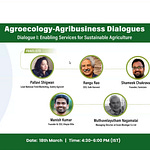If you want to find out how apples, which were once a winter-only fruit in India, became a year-round consumption phenomenon, you must speak to Sumit Saran.
If you’ve entered any Indian supermarket, whether it is Grapes, Apples, Pears, Prunes, Kiwi Fruits, Hazelnuts, Extra Virgin Olive Oil, Walnuts, Pistachios, or Avocados, you'd see a lot of international brands making inroads over the last two decades.
Last October, when Ajay TG, General Manager, Westfalia Fruit India, joined ABM Townhall, we delved deep into India’s phenomenal growth story of Avocado. Few weeks ago, I got to speak with Sumit Saran, one of the powerful brains behind several international food brands making a beeline into the Indian market.
Sumit Saran’s illustrious twenty-nine-year career serves as a fascinating window to reflect on the burgeoning aspirations of India’s consuming class.
In this fascinating conversation, we spoke about
0:57 Early Days of Sumit setting up Agribusiness Information Center in FICCI
5:51 Indian Government’s Open General License [OGL] Policy Changes in Importing Foods and how an accidental encounter led to Sumit launching California Grapes in India.
7:51 Sumit’s foray into the Future Group and his encounters with Kishore Biyani
10:20 Sumit’s collaboration with Washington Apples, USA Pears, California Pistachios and starting SS Associates
12:31 How did the transition to OGL happen? Are there lessons from the transition for today’s Indian food tech players? How did a country with the second-largest population, and second-largest fruits and vegetable producer in the world, become the twelfth-largest food market consumer in the world?
15:32: Why the returns to the farmers have been abysmal and what can we learn from Chile and US?
16:00 Seeing the Market from Outside-In View: Why is the Indian Market complex with a ‘high-threat factor’? Figuring out the TAM for each fruit and segmenting the customers.
19:40 How Sumit sees the evolution of Indian markets, given how COVID disrupted food supply chains?
22:04 Why the small neighborhood Indian food retailers didn’t get the recognition they deserved?
23:04 Why the food industry grows 3-4 % higher than the GDP?
24:04 Indian consumer’s foray into healthy eating; ‘If 1 % of India wants blueberries, you are talking of Australia wanting blueberries’
24:45 Trade-offs between local resilience and international competitiveness; Building International Cooperative Groups for Indian fruits; Which Indian products have the potential for global growth? The case of Purandar Highlands Figs being exported to the International Markets
27:02 Hiring Local Resources to Promote International Foods and Why it is the Missing Link for India; The Case of Chef Sanjeev Kapoor and Washington Apples; ‘Which Brit is Talking about Indian Grapes to Britishers in UK’? Why do promotions need to go beyond tradeshows? The need for APEDA to introspect its promotional activities for Indian fruits and vegetables.
29:41 ‘To be successful, you need to be a dot on a buyer’s calendar’. “India is a trading country, not an exporting country, especially in fruits and vegetables”; The case of Grapes and Basmati Rice; The potential to create thirty dots in India
31:25 Recommendations for APEDA to make India an exporting country; Branding India; The case of Assam Tea; The difference between a generic promotion and brand promotion;
33:57 Participating in Fruit Logistica Trade Show and Generic Promotions when the products have already reached the shelves of the retailer;
34:52 The Case of Araku Coffee and Max Havelar Certification; The Case of APEDA ban by USDA; The Missing Link of the Sanctity of the Logo;
36:59 Why the Grape Certification Systems in India is one of the best in the world? The Missing Link of Communicating the Certification to Customers; Difference between Retailers and Countries’ Certification Standards
37:51 Horizontal Trader Companies and Structuring Businesses Differently to Succeed; Creating Brand India;
40:53 Why the world is not a one-way street? Discerning between Company and Generic Promotion; The stagnation in the India Story;
42:56 ‘Indian Farmer is not somebody who needs your support. Let the farmer breathe’; The perils of farmers getting into export promotion and business trying out farming
44:01 The case of India’s food processing story; The Perils of FAIDA (Food and Agriculture Integrated Development Action) Report which gave India the ‘Sunrise Industry’ moniker;
45:39 Why Food Processing and Food Waste are two different problems and must not be conflated; Table Varieties Vs Processable Varieties; Food Processing Margins and Parks; Decentralized Village Entrepreneur Models
48:22 The Case for Creating a Market Buzz for Chittor Mango Pulp; ‘I am a big believer in Indian entrepreneurship.’; The role of Promotion Bodies and focusing on the size of the pie versus the piece of the pie;
50:31 The case of GI-tagged foods and the need to bridge the gap between the trade and the consumer space. Increasing Volumes and Margins simultaneously;
52:01 Farmers’ Share of the Pie and Improving Farmers’ Margins; Importing the most premium products and exporting the lowest products and why we need to reverse this?
54:33 The case of Indian bananas and its export potential; The case of Bhagwa pomegranate and its export potential; The importance of not interfering too much with farmers; Why we must pay attention to the low-hanging fruits and the high-hanging fruits, literally and metaphorically?
I hope you enjoy this conversation as much as I did.
So, what do you think?
How happy are you with today’s edition? I would love to get your candid feedback. Your feedback will be anonymous. Two questions. 1 Minute. Thanks.🙏
💗 If you like “Agribusiness Matters”, please click on Like at the bottom and share it with your friend.











